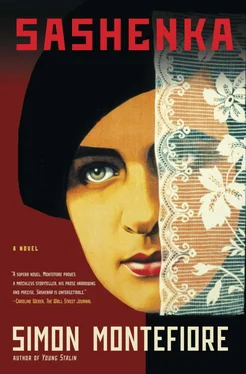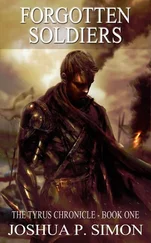“Say good night and thanks to Comrade Stalin,” said Sashenka, holding Snowy tightly.
“Night, night, Comrade Cushion,” said Snowy, waving her pink cushion.
“I’m sorry, Comrade Stalin…”
“No, no. That’s a first!” Stalin laughed. “Good-bye, Comrade Cushion.”
Sashenka carried Snowy from the room. “Comrade Stalin, you are so good with children. She’ll remember this all her life. I can’t thank you enough for your kindness and tolerance to Snowy.” Sighing with relief, she tucked Snowy into bed and the child was asleep a moment later.
When she returned to the sitting room, she was holding something. Stalin’s eyes flicked toward her hands. “Comrade Stalin, as a small thank you for the honor of having you as our guest, but really to thank you for your patience with our daughter, may I give you a gift of a sweater for your daughter Svetlana?” She held up a cashmere sweater that would fit the thirteen-year-old Svetlana Stalin and handed it to him.
“Where’s it from?” Stalin asked coldly.
Sashenka swallowed. It was from Paris. What should she say?
“It’s from abroad, Comrade Stalin. I am very proud of our Soviet products, which are better than any foreign luxuries, but this is just a simple sweater.”
“I wouldn’t accept it for myself,” said Stalin, puffing on a cigarette, “but since Svetlana is really the one who runs the country, I shall accept it for her.” Everyone laughed and Stalin stood up. “Right! Who’s up for a movie? I want to see Volga, Volga again.”
Almost everyone except Sashenka, who had to listen for the children, and Comrade Mendel, who said he was too tired and ill, was up for a movie. They piled into the cars to drive back to the movie theater in the Great Kremlin Palace. Stalin kissed Sashenka’s hand and complimented her dress again. Outside, he inspected the buds on the bushes.
“You grow roses here. And jasmine. I love roses.” Then, surrounded by the swaggering Georgians and the young men in white suits, he lumbered away in that heavy, slightly crooked gait, toward the waiting cars. Egnatashvili opened the door for him.
As he climbed into one of the cars, Vanya waved at Sashenka, exhilarated to be in the entourage for the first time. “Back soon, darling!” he called.
Beria kissed her on the mouth with his sausagey, blood-swollen lips. “ He likes you,” he said in his thick Mingrelian accent. “Well done. He’s got good taste, the Master. You’re my type too!”
Satinov was last to leave, peering round to make sure the bosses were in their cars. Doors slamming, wheels screeching, the clouds of exhaust and dust rising over the moon-kissed orchards, the Buicks and ZiSes revved up and skidded out of the drive.
“Phew, Sashenka!” he said. “Long live Cushionism! Kiss my goddaughter for me, the little charmer!” Feeling weak, Sashenka kissed Satinov good-bye. Then he jumped into the last car, which sped away.
The young men in white suits had disappeared.
Alone on the veranda, Sashenka looked up at the sky. Dawn had begun to break. Wondering if she had been dreaming, she went inside and looked into the children’s rooms.
Carlo had slept through it all but he had thrown off his pajamas and now lay naked with his head at the wrong end of the bed. His body was still wrapped in the pink fleshy curves of a baby and he held on to a soft rabbit. Sashenka shook her head with pleasure and kissed his satiny forehead.
Snowy slept like an angel in her pink room, her hands resting open on her pillow, on either side of her head. That damn cushion lay on her bare chest. Sashenka smiled. Even Comrade Stalin loved Cushion. What a strange night it had been.
Stalin sat in the middle pullout seat between the front and back seats of his new ZiS limousine, Beria in the back with Egnatashvili, and his chief bodyguard, Vlasik, in the front beside the driver. The rest were in other cars.
“To the Kremlin please, Comrade Salkov,” he told the driver gently. He knew the names and circumstances of all his bodyguards and drivers, was always kind to them and they were devoted to him. “Take the Arbat.”
“Right, Comrade Stalin,” said the driver. Stalin lit his pipe.
They sped down avenues of birch and spruce, the blossoms bright in the moonbeams. They came out on the Mozhaisk Highway, and took Dorogomilov Street.
“She’s a good Soviet woman, Sashenka,” said Stalin after a while to Beria, “don’t you think so, Lavrenti? And Vanya Palitsyn’s a good worker.”
“Agreed,” said Beria.
The convoy was on the Borodino Bridge with its stone bulls, its colonnades and obelisks, and about to cross Smolensk Square.
“That Sashenka can dance all right,” mused Egnatashvili, who was no politician but lived for sports, food, horses and girls.
“And she can edit too,” joked Stalin, “though that magazine’s hardly an academic journal. But that sort of housekeeping shit is important. Soviet women need to know these things.” They sped down the Arbat. “But what a family! She still has hints of her alien bourgeois origins—did you know she was at the Smolny? But she doesn’t bore us with stupid lectures like Molotov’s wife. Keeps home, makes cakes, raises children, works for the Party. She’s ‘reforged’ herself into a decent Soviet woman.”
“Agreed, Comrade Stalin,” said Beria.
“This’ll be about the tenth time I’ve seen Volga, Volga ,” said Stalin. “It’s always like a holiday every time I see it! I think I know it by heart!”
“Me too,” said Beria.
They were approaching the Kremlin along wide empty roads, the security cars in front, alongside and behind. The blood-red towers of the medieval fortress appeared up ahead of them, gates opening slowly, preparing to swallow them up. Guards saluted. The wheels gave rubber gulps over the cobbles. “Ivan the Terrible walked here,” said Stalin quietly. It had been his home for more than twenty years, longer than he had spent in his mother’s house, longer than the Seminary.
Stalin looked round at Beria, whose eyes were closed.
“Tell me, Lavrenti,” he said loudly, pointing his pipe, and Beria awoke with a start. “Where’s Sashenka’s father, Zeitlin the capitalist? I remember we checked him out. Is he still with you at one of your places or was he shot? Can we find out?”
“I like the article ‘How to Do the Foxtrot,’” said Sashenka, inspecting the proofs at her T-shaped desk. “Are you happy with it, comrades?”
Two days had passed, and she was in the offices of Soviet Wife and Proletarian Housekeeping on Petrovka. There were portraits of Stalin, Pushkin and Maxim Gorky on the walls; photographs of Vanya Palitsyn in uniform last May Day parade with Snowy and Carlo stood on her desk; and one grey Bakelite telephone and a very small grey safe sat on a table in the corner. The size of the safe, the number of phones and the quality of the Stalin portraits were signs of power. This was not a powerful office.
“We must entertain our readers, of course, Comrade Editor,” said Klavdia Klimov, the pointy-faced, bug-eyed deputy editor who dressed in the hideous shrouds of the Moscow Tailoring Factory. “But shouldn’t we also look at the class implications of foxtrot?”
Sashenka was a master at playing this game: she was herself a believer and took the journal’s mission seriously. She might still be a little dizzy from the excitements of the May Day holiday, but she knew the rules: never talk about the bosses and especially not the Master. Nonetheless, she hoped somehow the story would leak out. She wanted Klavdia and the three other editors in her office to know who had come to visit the Palitsyns on May Day night! After all, Comrade Stalin had endorsed the journal and her work, so shouldn’t she share this with her comrades? Several times it was on the tip of her tongue but even she balked at the scale of this name-dropping and she swallowed it…Back to the foxtrot and jazz dancing.
Читать дальше












